英语国际会议交流用语资料
- 格式:doc
- 大小:48.50 KB
- 文档页数:15
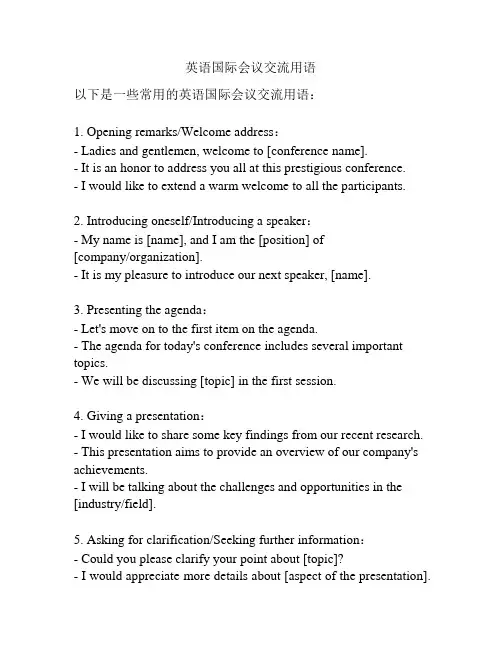
英语国际会议交流用语以下是一些常用的英语国际会议交流用语:1. Opening remarks/Welcome address:- Ladies and gentlemen, welcome to [conference name].- It is an honor to address you all at this prestigious conference.- I would like to extend a warm welcome to all the participants.2. Introducing oneself/Introducing a speaker:- My name is [name], and I am the [position] of[company/organization].- It is my pleasure to introduce our next speaker, [name].3. Presenting the agenda:- Let's move on to the first item on the agenda.- The agenda for today's conference includes several important topics.- We will be discussing [topic] in the first session.4. Giving a presentation:- I would like to share some key findings from our recent research. - This presentation aims to provide an overview of our company's achievements.- I will be talking about the challenges and opportunities in the [industry/field].5. Asking for clarification/Seeking further information:- Could you please clarify your point about [topic]?- I would appreciate more details about [aspect of the presentation].- Can you provide some examples to support your argument?6. Offering opinions/Contributing to the discussion:- In my opinion, it is crucial to prioritize sustainability in our business practices.- I believe that the proposed strategy will lead to significant growth. - I would like to suggest an alternative approach to solve the problem.7. Agreeing/disagreeing:- I fully agree with the point made by the previous speaker.- I respectfully disagree with the assertion that [statement].- While I understand the argument, I think we should consider other factors.8. Summarizing/Concluding:- In summary, today's discussions have highlighted the need for collaboration.- To conclude, we have identified several action points to address the challenges.- I would like to thank all the participants for their valuable contributions.9. Closing remarks:- It has been a fruitful and engaging conference, and I hope you have found it beneficial.- I would like to express my gratitude to the organizing committee and everyone involved.- We look forward to meeting you again at the next conference.这些用语可以帮助您在国际会议上流利地交流和参与讨论。
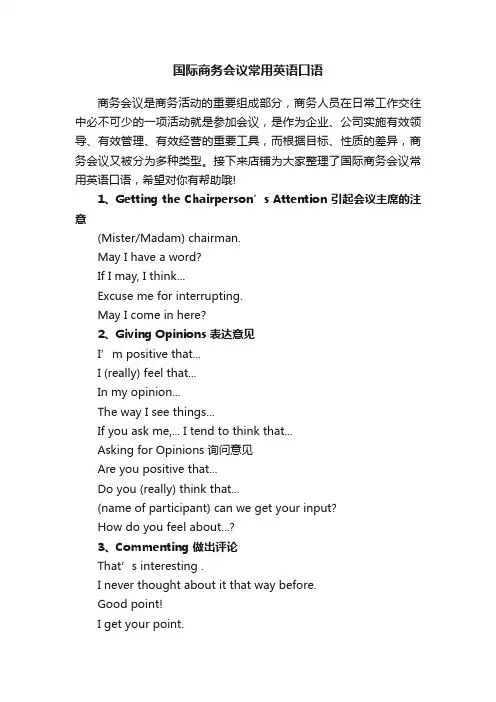
国际商务会议常用英语口语商务会议是商务活动的重要组成部分,商务人员在日常工作交往中必不可少的一项活动就是参加会议,是作为企业、公司实施有效领导、有效管理、有效经营的重要工具,而根据目标、性质的差异,商务会议又被分为多种类型。
接下来店铺为大家整理了国际商务会议常用英语口语,希望对你有帮助哦!1、Getting the Chairperson’s Attention 引起会议主席的注意(Mister/Madam) chairman.May I have a word?If I may, I think...Excuse me for interrupting.May I come in here?2、Giving Opinions 表达意见I’m positive that...I (really) feel that...In my opinion...The way I see things...If you ask me,... I tend to think that...Asking for Opinions 询问意见Are you positive that...Do you (really) think that...(name of participant) can we get your input?How do you feel about...?3、Commenting 做出评论That’s interesting .I never thought about it that way before.Good point!I get your point.I see what you mean.4、Agreeing 表示同意I totally agree with you.Exactly!That’s (exactly) the way I feel.I have to agree with (name of participant).5、Disagreeing 表示异议Unfortunately, I see it differently.Up to a point I agree with you, but...(I’m afraid) I can’t agree6、Advising and Suggesting 提出建议Let’s...We should...Why don’t you....How/What about...I suggest/recommend that...7、Clarifying 澄清Let me spell out...Have I made that clear?Do you see what I’m getting at?Let me put this another way...I’d just like to repeat that...8、Requesting Information 请求信息Please, could you...I’d like you to...Would you mind...I wonder if you could...9、Asking for Repetition 请求重复I’m afraid I didn’t understand that. Could you repeat what you just said?I didn’t catch that. Could you repeat that, please?I missed that. Could you say it again, please?Could you run that by me one more time?10、Asking for Clarification 要求澄清I don’t quite follow you. What exactly do you mean?I’m afraid I don’t quite understand what your are getting at.Could you explain to me how that is going to work?I don’t see what you mean. Could we have some more details, please?11、Asking for Verification 请求确认You did say next week, didn’t you? (’did’ is stressed)Do you mean that...?Is it true that...?12、Asking for Spelling 请求拼写Could you spell that, please?Would you mind spelling that for me, please?13、Asking for Contributions 请求赐教We haven’t heard from you yet, (name of participant).What do you think about this proposal?Would you like to add anything, (name of participant)?Has anyone else got anything to contribute?Are there any more comments?14、Correcting Information 更正Sorry, I think you misunderstood what I said.Sorry, that’s not quite right.I’m afraid you don’t understand what I’m saying.That’s not quite what I had in mind.That’s not what I meant.15、Keeping the Meeting On Target (time, relevance,decisions) 转入正题We’re running short of time.Well, that seems to be all the time we have today.Please be brief.I’m afraid we’ve run out of time.I’m afraid that’s outside the scope of this meeting.Let’s get back on track, why don’t we?That’s not really why we’re here today.Why don’t we return to the main focus of today’s meeting.We’ll have to leave that to another time.We’re beginning to lose sight of the main point.Keep to the point, please.I think we’d better leave that for another meeting.Are we ready to make a decision?。
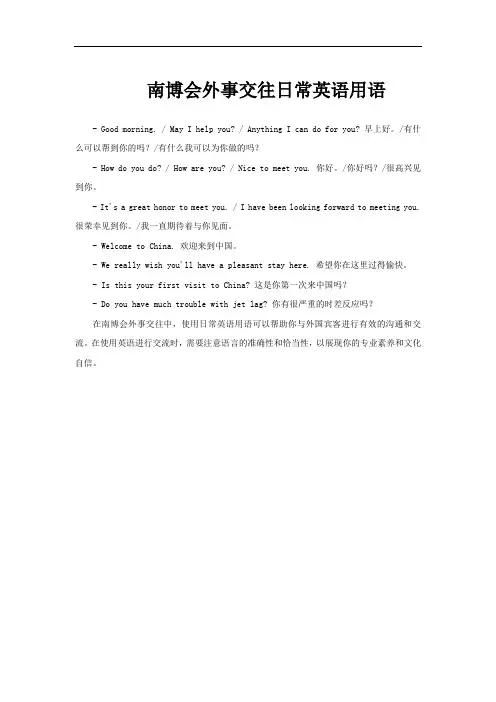
南博会外事交往日常英语用语
- Good morning. / May I help you? / Anything I can do for you? 早上好。
/有什么可以帮到你的吗?/有什么我可以为你做的吗?
- How do you do? / How are you? / Nice to meet you. 你好。
/你好吗?/很高兴见到你。
- It's a great honor to meet you. / I have been looking forward to meeting you. 很荣幸见到你。
/我一直期待着与你见面。
- Welcome to China. 欢迎来到中国。
- We really wish you'll have a pleasant stay here. 希望你在这里过得愉快。
- Is this your first visit to China? 这是你第一次来中国吗?
- Do you have much trouble with jet lag? 你有很严重的时差反应吗?
在南博会外事交往中,使用日常英语用语可以帮助你与外国宾客进行有效的沟通和交流。
在使用英语进行交流时,需要注意语言的准确性和恰当性,以展现你的专业素养和文化自信。
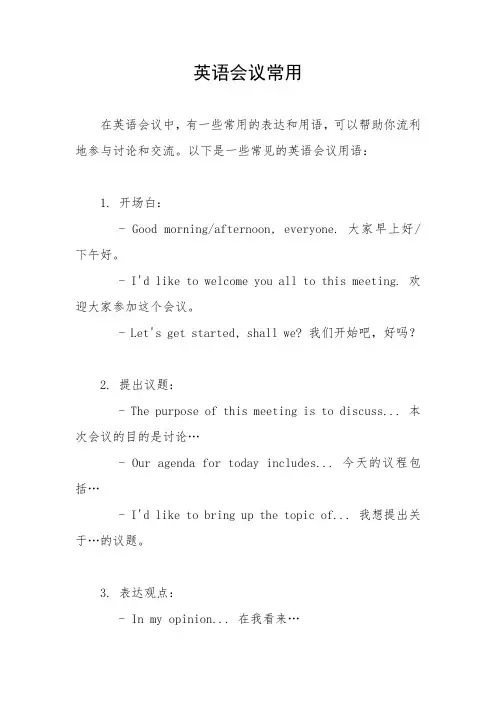
英语会议常用在英语会议中,有一些常用的表达和用语,可以帮助你流利地参与讨论和交流。
以下是一些常见的英语会议用语:1. 开场白:- Good morning/afternoon, everyone. 大家早上好/下午好。
- I'd like to welcome you all to this meeting. 欢迎大家参加这个会议。
- Let's get started, shall we? 我们开始吧,好吗?2. 提出议题:- The purpose of this meeting is to discuss... 本次会议的目的是讨论…- Our agenda for today includes... 今天的议程包括…- I'd like to bring up the topic of... 我想提出关于…的议题。
3. 表达观点:- In my opinion... 在我看来…- From my point of view... 从我的角度来看…- I believe that... 我相信…4. 请求意见或建议:- What do you think about...? 你对…有什么看法?- Do you have any suggestions on...? 对于…你有什么建议?- Could you please give us your input on...? 你能否提供一些关于…的意见?5. 辩论和回应:- I see your point, but... 我理解你的观点,但是…- That's a valid argument, however... 那是一个合理的论点,但是…- I respectfully disagree. 我持不同意见。
6. 提出解决方案:- One possible solution could be... 一个可能的解决方案是…- How about we try...? 我们试试…怎么样?- I suggest that we... 我建议我们…7. 总结和结束会议:- To summarize... 总结一下…- In conclusion... 总而言之…- Thank you all for your participation. 感谢大家的参与。
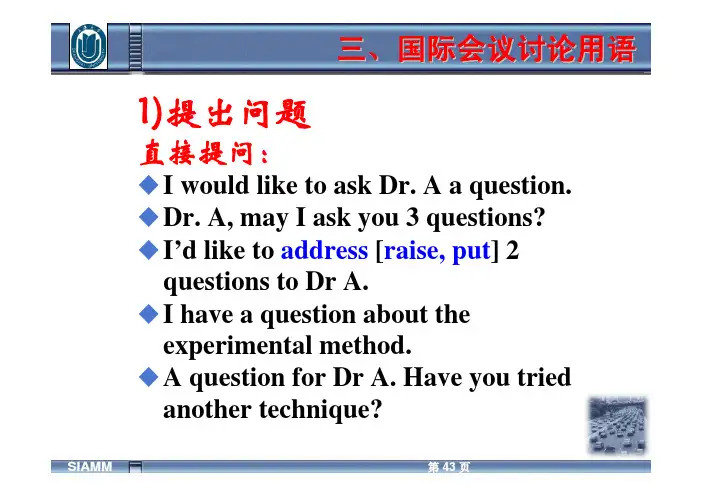
1)提出问题直接提问:I would like to ask Dr. A a question. Dr. A, may I ask you 3 questions? I’d like to address[raise, put] 2 questions to Dr A.I have a question about the experimental method.A question for Dr A. Have you tried another technique?1)提出问题直接提问:There are several questions I’ve wanted to ask.I’d like to ask, is it a suitable method for determining…?I’d like to ask Dr A how he would explain this phenomenon.I’d like to ask Dr A why she objects to using this method.1)提出问题间接提问:Dr A,I wonder if you would explain…I wonder if you could elaborate on that.I am wondering if you have ever read that paper.I’d like to ask Dr A if he could explain the reason more clearly.I’d like to hear a little more about the conclusion.1)提出问题间接提问:I am anxious to know Professor A’s recommendations for the new software.I would be interested in hearing other views from Dr A.I’d be glad to know if the algorithm will work well for other problems.I don’t know whether anyone else here has had experience with this problem.1)提出问题询问原因:What is the cause of the time delay?Is there any reason to believe that the new method[model] is more effective? Can you give us the reason for your statement?Could you tell us why?How do you account for the difference between your theory and others?1)提出问题询问区别:Can you make a distinction between the two principles?How do you distinguish good algorithms from the bad ones?How do your results compare with those of Dr A?Do you note any difference in scales between the two phenomena?1)提出问题询问关系:Can tell us the relation between these two phenomena?Do you think there is any correlation between A and B?How does A correlate with B?Do you see any relation between A and B?2)提出请求请求提出证据:Is there any evidence that A depends on B?Do you have any spectrum evidence for the structure?What is your evidence for your theory? Do you have any data on the results?2)提出请求请求提供信息:Do you have any more information on recent progress in this field?Is there any statistical information concerning?I wonder if you would mind telling me how successfully the research was.I’d like to ask what the nanometer carbon tube looks like.2)提出请求请求充分阐释:Do you have any further explanation for this difference ?Could you offer some explanation of how the device works?I wonder if you would clarify this point. Would you enlighten us a bit more on the mechanism of…?Could you detail your procedure of …?2)提出请求请求作出评论:I wonder if I could ask you to comment on it a little further.Would you be so kind to[care to, please] comment on this?I would particularly like to hear a comment about this point.May I ask you to give us your opinion about the application of the theory?2)提出请求请求作出评论:I’d like to have your view on this topic. What, in your opinion, is the most important step in this procedure?Do you have any idea about A?Do you think Dr A is right?Do you have any speculation about the reason?3)回答问题积极的回答:A good question. I’d be delighted to answer.I’d like to respond to that question briefly.Let me first reply rapidly to the first question.May I answer your second question first?3)回答问题积极的回答:In answer the second question, I would say that it is a good idea.The simplest answer to your question would be that we concluded based on the experimental observations.Let me try to answer these questions one by one.I think I can answer this question simply.3)回答问题不完全回答:I can only provide[have] a partial answer to that question.In partial answer Dr A’s question, it may be relevant to indicate that we are studying on the problem.3)回答问题消极的回答:I (really, am afraid, just) don’t know. I’m sorry, but I don’t know.I don’t know exactly yet.I don’t know how to do that[enough about that, of any such studies].I don’t know about the availability of this matrial.I know very little about it.3)回答问题消极的回答:I’m not sure.I’m not sure of the answer[I can answer the question, whether it is necessary, I understand what you mean].I’m afraid I cannot answer your question. I’m afraid I cannot give you a precise answer.I can’t answer your question accurately right now.3)回答问题关于证据:I do have some evidence to support the mechanism. …I have sufficient data on this point.I can give you some quantitative evidence to explain this.I don’t have any data available to answer your question.I have no idea about it.3)回答问题关于信息:I have some information regarding your question. I’ll give you later.I can offer some experimental information on this.I do not have any exact information on it.I think it is regrettable there is little information on the subject.3)回答问题关于阐释:I’d like to give further explanation for it. …I do not have any explanation for…I know of no good explanation for the phenomenon.3)回答问题对问题的评价:That’s a good[a pertinent, a big, a crucial, a valid, an important, an interesting, an excellent, a difficult, a complicated, a difficult, a sophisticated, a tough, a hard] questionThat is a good question, but a complicated one to answer.I appreciate the question.3)回答问题对问题的评价:I think that your question is really to the point.I’m delighted you put the question to me.Thank you for asking that question.If I understand your question correctly, I can say that the conclusion is right.3)回答问题征求回音:Does that answer your question? Did I answer you satisfactorily? Is this you wanted me to answer?4)讨论发言表示同意:I agree.I agree with you (on your last statement, about the analysis, on that point,…).I agree to your idea [your opinion, your suggestion].I agree to discuss with you on that point. Your counterproposal is agreeable to us.I am in complete agreement with you.4)讨论发言表示同意:I accept this criticism entirely.I concur with his opinion.I share your comments[opinion] about A.I don’t disagree with you.I am not in disagreement with you on this point.I have no objection to…4)讨论发言表示支持:I am in favor of the principles of yours.I favor this mathematical formulation.I’d like to support Dr A’s remarks.I’d like to present additional information in support of Dr A’s observations.I’d like to endorse Dr A/s views about…I want to defend Dr A.I’d like to reinforce Dr A’s remarks about..4)讨论发言表示反对:I disagree with you[that comment].I’m sorry, but I must disagree with Dr A there.I have a slight disagreement with you on the matter of…I am in disagreement with you about the explanation.I differ with you on the matter.4)讨论发言表示反对:You may be right, but I view it a little differently.I respect your opinion, but I think otherwise.The difference between our opinions is too wide to be easily changed.I don’t agree with that idea.I can’t say that I agree.三、国际会议讨论用语4)讨论发言表示反对:I would be opposed to that hypothesis.I strongly oppose that plan.I would speak in opposition to Dr A’s proposal.I would object to Dr A’s statement.I’d like to raise an objection to his idea.I’d like to take issue with some of his idea.谢谢关注!。
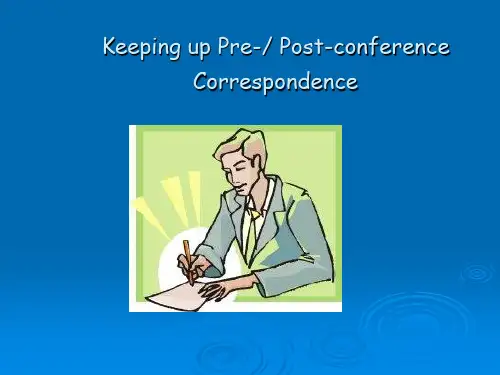
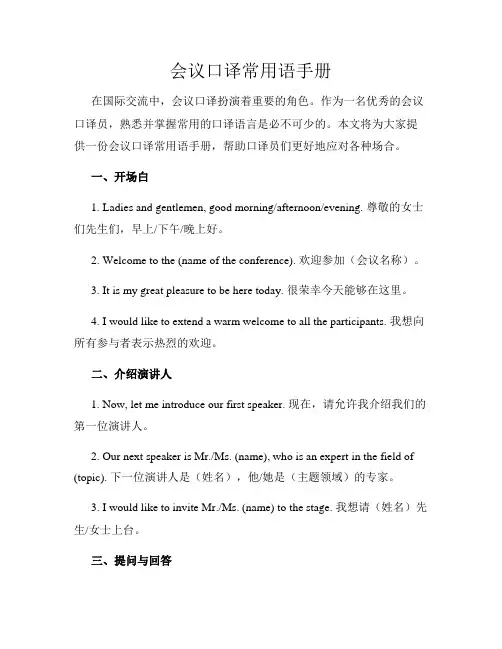
会议口译常用语手册在国际交流中,会议口译扮演着重要的角色。
作为一名优秀的会议口译员,熟悉并掌握常用的口译语言是必不可少的。
本文将为大家提供一份会议口译常用语手册,帮助口译员们更好地应对各种场合。
一、开场白1. Ladies and gentlemen, good morning/afternoon/evening. 尊敬的女士们先生们,早上/下午/晚上好。
2. Welcome to the (name of the conference). 欢迎参加(会议名称)。
3. It is my great pleasure to be here today. 很荣幸今天能够在这里。
4. I would like to extend a warm welcome to all the participants. 我想向所有参与者表示热烈的欢迎。
二、介绍演讲人1. Now, let me introduce our first speaker. 现在,请允许我介绍我们的第一位演讲人。
2. Our next speaker is Mr./Ms. (name), who is an expert in the field of (topic). 下一位演讲人是(姓名),他/她是(主题领域)的专家。
3. I would like to invite Mr./Ms. (name) to the stage. 我想请(姓名)先生/女士上台。
三、提问与回答1. Do you have any questions? 你们有什么问题吗?2. Please raise your hand if you have a question. 如果你有问题,请举手。
3. Could you please repeat the question? 你能再重复一遍问题吗?4. Thank you for your question. 谢谢你的问题。
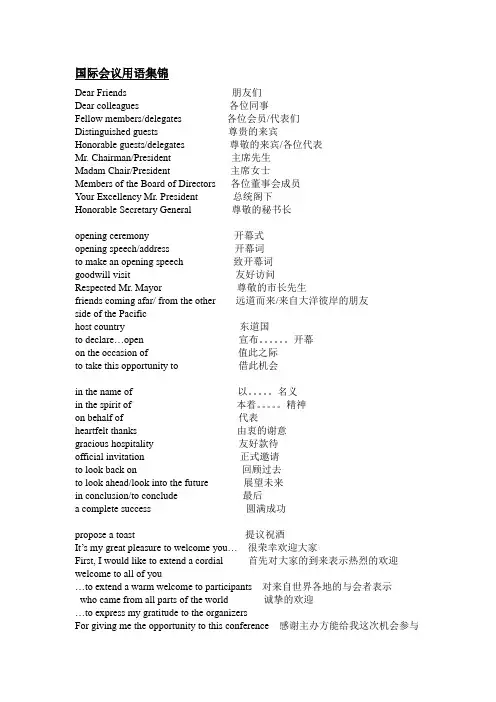
国际会议用语集锦Dear Friends 朋友们Dear colleagues 各位同事Fellow members/delegates 各位会员/代表们Distinguished guests 尊贵的来宾Honorable guests/delegates 尊敬的来宾/各位代表Mr. Chairman/President 主席先生Madam Chair/President 主席女士Members of the Board of Directors 各位董事会成员Your Excellency Mr. President 总统阁下Honorable Secretary General 尊敬的秘书长opening ceremony 开幕式opening speech/address 开幕词to make an opening speech 致开幕词goodwill visit 友好访问Respected Mr. Mayor 尊敬的市长先生friends coming afar/ from the other 远道而来/来自大洋彼岸的朋友side of the Pacifichost country 东道国to declare…open 宣布。
开幕on the occasion of 值此之际to take this opportunity to 借此机会in the name of 以。
名义in the spirit of 本着。
精神on behalf of 代表heartfelt thanks 由衷的谢意gracious hospitality 友好款待official invitation 正式邀请to look back on 回顾过去to look ahead/look into the future 展望未来in conclusion/to conclude 最后a complete success 圆满成功propose a toast 提议祝酒It’s my great pleasure to welcome you…很荣幸欢迎大家First, I would like to extend a cordial 首先对大家的到来表示热烈的欢迎welcome to all of you…to extend a warm welcome to participants 对来自世界各地的与会者表示who came from all parts of the world 诚挚的欢迎…to express my gratitude to the organizersFor giving me the opportunity to this conference 感谢主办方能给我这次机会参与This conference is sponsored by A and 这次会议是由A主办,B协办。
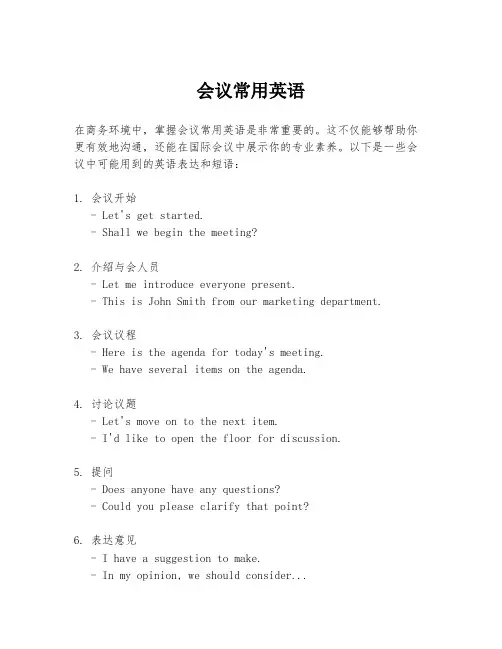
会议常用英语在商务环境中,掌握会议常用英语是非常重要的。
这不仅能够帮助你更有效地沟通,还能在国际会议中展示你的专业素养。
以下是一些会议中可能用到的英语表达和短语:1. 会议开始- Let's get started.- Shall we begin the meeting?2. 介绍与会人员- Let me introduce everyone present.- This is John Smith from our marketing department.3. 会议议程- Here is the agenda for today's meeting.- We have several items on the agenda.4. 讨论议题- Let's move on to the next item.- I'd like to open the floor for discussion.5. 提问- Does anyone have any questions?- Could you please clarify that point?6. 表达意见- I have a suggestion to make.- In my opinion, we should consider...7. 达成共识- It seems we've reached a consensus.- Let's summarize the points we've agreed on.8. 记录会议- Please make sure to take detailed minutes.- The minutes will be circulated to all participants.9. 会议结束- The meeting is adjourned.- Thank you for your participation.10. 后续行动- We will follow up on this issue next week.- Please send me an email with the action items.在会议中,清晰、简洁的表达是关键。
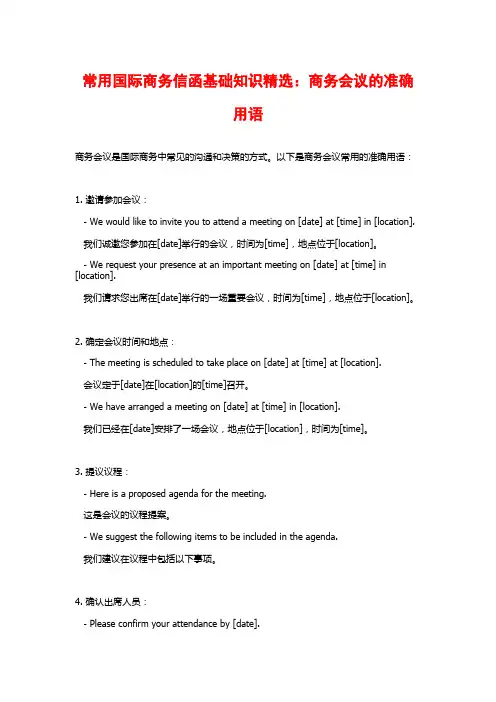
常用国际商务信函基础知识精选:商务会议的准确用语商务会议是国际商务中常见的沟通和决策的方式。
以下是商务会议常用的准确用语:1. 邀请参加会议:- We would like to invite you to attend a meeting on [date] at [time] in [location]. 我们诚邀您参加在[date]举行的会议,时间为[time],地点位于[location]。
- We request your presence at an important meeting on [date] at [time] in [location].我们请求您出席在[date]举行的一场重要会议,时间为[time],地点位于[location]。
2. 确定会议时间和地点:- The meeting is scheduled to take place on [date] at [time] at [location].会议定于[date]在[location]的[time]召开。
- We have arranged a meeting on [date] at [time] in [location].我们已经在[date]安排了一场会议,地点位于[location],时间为[time]。
3. 提议议程:- Here is a proposed agenda for the meeting.这是会议的议程提案。
- We suggest the following items to be included in the agenda.我们建议在议程中包括以下事项。
4. 确认出席人员:- Please confirm your attendance by [date].请在[date]前确认您的出席。
- We would appreciate it if you could let us know whether you will be able to attend the meeting.若能让我们知道您能否参加会议,我们将不胜感激。
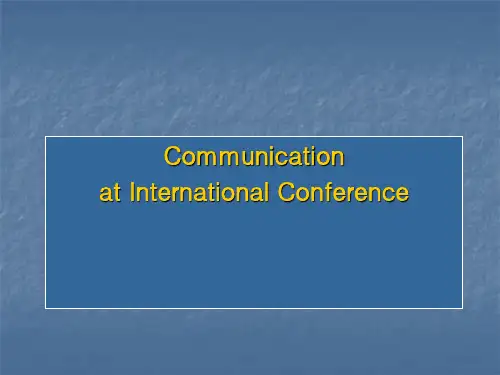
Useful Expressions for Conference1. Address/Greeting(致辞、问候)(1)尊敬的胡主席/温总理Honorable chairman Hu, Honorable premier Wen,主席还可以用: Your Excellency or His / Her Excellency千万不可用respected; 若是国王,一般用Your Majesty.(2)尊敬的王大使/裴校长Your Honor ambassador Wang / principal Pei.Honorable ambassador Wang / principal Pei.(3)各位嘉宾Distinguished guests.2. Pleasure(客套话)(1)很高兴和大家相聚一堂,共商教育大计It’s my great pleasure to gather together with you and talk about education.I’m pleasure to be here with you to talk about education.(2)很高兴能请到韩市长来参加我们的会议It’s my great pleasure to have Mayor Han with us today.It’s our great honor to have Mayor Han with us today.要用have sb. with us 句型; 千万不能用invite.(3)很高兴能认识您It’s my pleasure to get to know you.It’s my pleasure to meet you.It’s my pleasure to your acquaintance.3. Welcome(1)我谨代表我公司全体员工向来自太平洋彼岸的朋友们表示热烈的欢迎。
Ladies and Gentlemen, Distinguished Delegates, Colleagues:Good morning/afternoon. It is a great honor and pleasure to stand before you today at this prestigious international conference. As we gather here from various corners of the globe, we are united by a common goal: to discuss and find solutions to the pressing challenges of sustainable development. In my speech today, I will focus on the current challenges, the opportunities that lie ahead, and the collective responsibility we all share in shaping a sustainable future.Current Challenges: A Call to ActionFirstly, let us acknowledge the current challenges that threaten our planet and its inhabitants. Climate change remains the most pressing issue of our time. The Intergovernmental Panel on Climate Change (IPCC) has issued stark warnings about the escalating consequences of global warming. Rising sea levels, extreme weather events, and the loss of biodiversity are just a few of the devastating impacts we are already witnessing.Moreover, inequality and poverty continue to be pervasive issues. Despite significant progress in reducing extreme poverty over the past few decades, millions of people still lack access to basic services such as clean water, sanitation, healthcare, and education. This gap not only hinders human development but also exacerbates social tensions and conflicts.The COVID-19 pandemic has further highlighted the interconnectedness of our world and the vulnerabilities of our global systems. It has exposed weaknesses in healthcare systems, supply chains, and social protection mechanisms. The economic impact of the pandemic has disproportionately affected the most vulnerable populations, deepening the divide between the rich and the poor.Opportunities for Sustainable DevelopmentDespite these challenges, there are numerous opportunities for sustainable development that we cannot afford to ignore. Innovation andtechnology have the potential to revolutionize our approach to environmental protection, social justice, and economic growth.Renewable energy sources, such as solar, wind, and hydroelectric power, are becoming increasingly cost-effective and efficient. The transition to a low-carbon economy is not only necessary to mitigate climate change but also presents a massive economic opportunity. The global renewable energy market is expected to grow exponentially in the coming years, creating jobs and stimulating economic growth.Innovation in agriculture and food systems can address both foodsecurity and environmental sustainability. Precision farming, vertical farming, and the development of climate-resilient crop varieties can enhance productivity while reducing the environmental footprint of agriculture.Moreover, digital technology has the potential to transform education, healthcare, and governance. E-learning platforms, telemedicine, and blockchain can improve access to quality services and promote transparency and accountability.Collective Responsibility and CollaborationThe realization of these opportunities requires collectiveresponsibility and collaboration. Governments, businesses, civil society organizations, and individuals must work together to create an enabling environment for sustainable development.Governments have a crucial role to play in setting ambitious targets and implementing policies that promote sustainable practices. This includes investing in renewable energy infrastructure, implementing progressive taxation systems, and ensuring that social protection measures are in place for the most vulnerable.Businesses must embrace sustainable practices and innovation, not only to comply with regulatory requirements but also to drive economic growth and enhance their competitive advantage. The concept of the circular economy, where resources are reused and recycled, offers a promising path forward.Civil society organizations and individuals can contribute by raising awareness, advocating for change, and participating in community-based initiatives. The power of collective action cannot be underestimated.ConclusionLadies and Gentlemen, the future of sustainable development lies in our hands. We are at a critical juncture where the decisions we make today will shape the world our children and grandchildren inherit. It is a future filled with challenges, but also with immense opportunities.Let us seize these opportunities by working together, fostering innovation, and promoting a culture of sustainability. Let us remember that we are all stakeholders in this journey and that our collective actions can and will make a difference.Thank you for your attention, and I look forward to engaging in a productive dialogue with you over the course of this conference.结束Title: The Future of Sustainable Development: Challenges and Opportunities女士们,先生们,尊敬的各位代表,同事们:上午/下午好。
英语国际会议交流用语第一篇:英语国际会议交流用语一、开幕式中,宣布开幕、欢迎词及贺词。
(1)Mr President of the Congress, President A and distinguished guests: 尊敬的大会的主席先生,会长A和贵宾们。
(2)Dr.(Professor)A, Dr.(Professor)B, ladies and gentlemen.A博士(教授)、B博士(教授),女士们,先生们。
(3)Mr.Chairman, fellow delegates, friends.主席先生、同仁们、朋友们。
2 宣布开会。
(4)I am very pleased and honored to declare(the conference)open.我很高兴和荣幸地宣布···开幕。
3 来宾在开幕式上致辞。
(5)I am greatly honored to give the opening address/speech at thi s ···(3rd)International Congress of ABC here in Beijing 我深感荣幸在北京举办的第···次ABC国际大会上致开幕词。
4 主办单位对参会者致欢迎词。
(6)On behalf of the ABC society, I am delighted to welcome all of you to the ···(1st)International Symposium of XYZ.我很高兴代表ABC学会欢迎你们所有的人来参加第··· 届XYZ国际学术会议。
(7)You have come all the way for this conference.Thank you very much for your attention/participation.你们远道而来参加会议。
国际学术会议常用语(英语)第一篇:国际学术会议常用语(英语)学术会议常用表达1.有关会议的一般信息(1)名称conference academic conference annual meeting/symposium/conferenceinternational conference forum, international forumsymposium workshop(2)日期dates/important dates/key dates(3)地点location/venue conference location/venue(4)主题issues/themes/(main)topics/scope of conference topic of interestsconference themes/topics 2.论文征稿、提交与录用call for abstract/proposal/paperpaper deadline deadline for abstract/full paper/proposal submission submission deadlinedeadline extended date for mortification of acceptance Paper acceptance/rejection will be informed by… deadline for authors notificationcamera ready version deadline 3.会议注册deadline/closing date for registration registration fees and itemstelegraphic transfer onlyregistration form official invitation letter bank transferregistration informationpayment bank draft/check 4.会议进程及内容conference schedule/programpreliminary conference programfinal conference programopening ceremony/session keynote session/parallel session/tutorial sessionkeynote speech oral presentationposter presentationtea/coffee break(buffet)lunch/(buffet)supper(welcome)banquet5.会议具体细节openingquestion and answerintroduction to speaker comment on speakertheme/paper presentation closing 6.学术会议的问答讨论环节口语学术报告之后的问答讨论环节(Question and Answer Session)是同行之间交流的良好机会,双方可以针对报告中的具体问题进行探讨(1)答问的方式与技巧回答讨论环节可以让报告人通过互动及时地获得信息反馈并可以把在讨论中或得的建设性建议用于下一步的工作,因此对科研工作有很大的促进作用。
国外开会常用语1. “Let's get down to business.”(咱们开始谈正事吧。
)例如:大家在会前闲聊了一会儿,我看时间差不多了,就说“Let's get down to business. We have a lot to cover today.”2. “I'm all ears.”(我洗耳恭听。
)就像同事在阐述一个新的项目计划时,我会说“Go ahead. I'm all ears. Ican't wait to hear your ideas.”3. “That's a great point.”(这是个很棒的观点。
)比如在会议讨论中,有人提出了一个很有建设性的想法,我马上回应“That's a great point. It could really improve our strategy.”4. “Could you clarify that?”(你能解释一下那个吗?)假设会上有人说了一个比较模糊的概念,我疑惑地问“Could you clarify that? I'm not quite sure what you mean.”5. “Let me play devil's advocate for a moment.”(让我暂时唱下反调。
)在大家都一致同意某个方案的时候,我可能会说“Let me play devil's advocate for a moment. What if we face some unexpected problems?”6. “In a nutshell.”(简而言之。
)当我总结自己的观点时会说“In a nutshell, we should focus more on customer satisfaction.”7. “We're on the same page.”(我们意见一致。
英语国际会议交流用语一、开幕式中,宣布开幕、欢迎词及贺词。
(1)Mr President of the Congress, President A and distingu ished guests:尊敬的大会的主席先生,会长A和贵宾们。
(2)Dr. (Professor) A, Dr. (Professor) B, ladies and gen tlemen.A博士(教授)、B博士(教授),女士们,先生们。
(3)Mr. Chairman, fellow delegates, friends. 主席先生、同仁们、朋友们。
2 宣布开会。
(4)I am very pleased and honored to declare(the confer ence)open.我很高兴和荣幸地宣布···开幕。
3 来宾在开幕式上致辞。
(5)I am greatly honored to give the opening address/spe ech at this···(3rd) International Congress of ABC here in Beijin g我深感荣幸在北京举办的第···次ABC国际大会上致开幕词。
4 主办单位对参会者致欢迎词。
(6)On behalf of the ABC society, I am delighted to we lcome all of you to the ···(1st) International Symposium of XYZ.我很高兴代表ABC学会欢迎你们所有的人来参加第···届XYZ国际学术会议。
(7)You have come all the way for this conference. Than k you very much for your attention/participation.你们远道而来参加会议。
谢谢你们出席会议(参加会议)。
5 参加者对主办单位表示赞赏。
(8)Thank you for your invitation and warm hospitality.谢谢你们的邀请和盛情款待。
6 介绍会议的背景。
(9)The history of this gathering/conference goes back to September 1982, when it first became apparent to us t hat developments in the field of ABC had become so importan t that a conference seemed mandatory.此次会议的历史可追溯到1982年9月,当时ABC领域的发展已变得如此重要,组织一次会议显然是必要的。
7 介绍会议的目的和期望。
(10)The goals of this Conference are threefold. First, it should provide a forum for the exchange of informatio n between participants in this interdisciplinary meeting. Seco nd, it should provide an opportunity to establish and rene w personal relationships between participants, and finally, i t should stimulate the interest and ambition of participants from all over the world to cooperate in their efforts.这个会议的目标有三重。
第一,它必须为参会者在这个属于交叉学科的会议上提供信息交流的一个论坛。
第二,它必须为参会者之间提供一个重温旧情并结交新友的一种机会。
最后,它必须激励来自世界各地的参会者尽力进行合作的兴趣和劲头。
(11)It is the aim of this conference to bring together mainly those who have contributed over a period of years to this subject. Our purpose here is to define the present status o f knowledge concerning ABC in five different field. First…Se cond…third…fourth…finally…,这个会议的目标主要是将在几年期间对这个课题已作出贡献的各位集合在一起。
我们的目的是说明有关ABC在五个不同领域中的认识现状。
(12)This conference will focus on the discussion of the various aspects of ABC这个会议将主要讨论有关ABC的各个方面。
(13)I hope that this XXth(6th) International Congress of ABC wil l improve our understanding of DEF. I also hope that the C ongress will provide the opportunity for personal exchange of scientific results, facilitate the making of new acquaintanc es, and strengthen personal friendships among scientists (part icipants) from different parts of the world.我希望这次第XX届国际ABC大会将增进我们对DEF的了解。
我还希望大会将为个人间进行科学结果的交流提供机会,有利于结识新知识和加强世界各地的科学家(参会者)之间的个人友谊。
第二章主持报告会用语一.报告开始前的用语1. 宣布报告会开始(14)Good morning, Ladies and Gentlemen: It is a (great) plea sure (for me) [It gives me pleasure /It is a privilege (fo r me) / I am happy / I am privileged ] to welcome you t o Session on ABC.早安,女士们,先生们,我很高兴欢迎诸位参加ABC会议。
2. 主持人自我介绍和介绍其他主持人(15)I am Dr. A from ABC University, China, and I am going to be in the chair for this afternoon’s session.我是中国ABC大学的A博士。
我将是今天下午会议的主席。
3. 宣布报告的时间限制(16) There are some basic rules. First, please limit you r presentation in 15 minutes. At the end of each presentati on, there will be 5 minutes for discussion. At the end of the session we will have anopen discussion on any of the papers presented.我先说下基本要求,每个报告限时15分钟,在每个报告后有5分钟的讨论时间,在回忆结束时,我们将敞开讨论任何一篇已报告过的论文。
4. 报告程序的更改事项(17)Unfortunately, we have to cancel paper No.10 and No.11 不幸地,我们要撤去二篇论文,即第10和第11篇。
(18)We have to reverse the order of No.5 and No.6.时刻表有改变。
第五篇和第六篇对调。
(19)There has been some change in the people listed on the pro gram. Dr. A who was expected to present the second paper c ould not attend this meeting, and Dr. B will present the p aper.列在节目单上的报告人已有些变动,原定由A博士报告的第二篇论文,因(他)不能出席这个会议,而由B博士来报告。
二.主持报告用语1.宣布开始和引导演讲(20)The first paper this morning will be presented by Dr. A, p rofessor of polymer science at XYZ University, and his topic is “…(title)…“,Dr. A.今天上午第一篇论文将由XYZ大学高分子科学教授A博士宣读。
他的题目是“…(题目)…“,A博士。
(21)The next presentation in this session is on “……(title)……”. I would like to call on [ask] Dr. A to talk this very important subject.本会场下一个报告是:“……(题目)……”。
我想请[要求]A博士谈谈这一十分重要的课题。
2. 演讲顺序进行(22)Sorry, the schedule is very [rather] tight. We haven’t any time for discussion, so we must Go on to next paper.对不起,议程十分[有点]紧,我们没有时间讨论了,所以我们必须继续下一篇报告3.报告中对演讲者的提示(23)Dr. A , I’m sorry, but we do have to move on; we are running short of time.A博士,很抱歉,我们必须往下赶;时间快要完了。